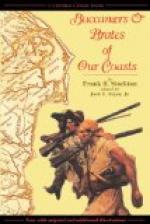But the trading vessels which sailed from Europe to that part of the Caribbean Sea were manned by bold and daring sailors, and when they knew that San Domingo contained an abundance of beef cattle, they did not hesitate to stop at the little seaports to replenish their stores. The natives of the island were skilled in the art of preparing beef by smoking and drying it,—very much in the same way in which our Indians prepare “jerked meat” for winter use.
But so many vessels came to San Domingo for beef that there were not enough people on the island to do all the hunting and drying that was necessary, so these trading vessels frequently anchored in some quiet cove, and the crews went on shore and devoted themselves to securing a cargo of beef,—not only enough for their own use, but for trading purposes; thus they became known as “beef-driers,” or buccaneers.
When the Spaniards heard of this new industry which had arisen within the limits of their possessions, they pursued the vessels of the buccaneers wherever they were seen, and relentlessly destroyed them and their crews. But there were not enough Spanish vessels to put down the trade in dried beef; more European vessels—generally English and French—stopped at San Domingo; more bands of hunting sailors made their way into the interior. When these daring fellows knew that the Spaniards were determined to break up their trade, they became more determined that it should not be broken up, and they armed themselves and their vessels so that they might be able to make a defence against the Spanish men-of-war.
Thus gradually and almost imperceptibly a state of maritime warfare grew up in the waters of the West Indies between Spain and the beef-traders of other nations; and from being obliged to fight, the buccaneers became glad to fight, provided that it was Spain they fought. True to her policy of despotism and cruelty when dealing with her American possessions, Spain waged a bitter and bloody war against the buccaneers who dared to interfere with the commercial relations between herself and her West India colonies, and in return, the buccaneers were just as bitter and savage in their warfare against Spain. From defending themselves against Spanish attacks, they began to attack Spaniards whenever there was any chance of success, at first only upon the sea, but afterwards on land. The cruelty and ferocity of Spanish rule had brought them into existence, and it was against Spain and her possessions that the cruelty and ferocity which she had taught them were now directed.
When the buccaneers had begun to understand each other and to effect organizations among themselves, they adopted a general name,—“The Brethren of the Coast.” The outside world, especially the Spanish world, called them pirates, sea-robbers, buccaneers,—any title which would express their lawless character, but in their own denomination of themselves they expressed only their fraternal relations; and for the greater part of their career, they truly stood by each other like brothers.




